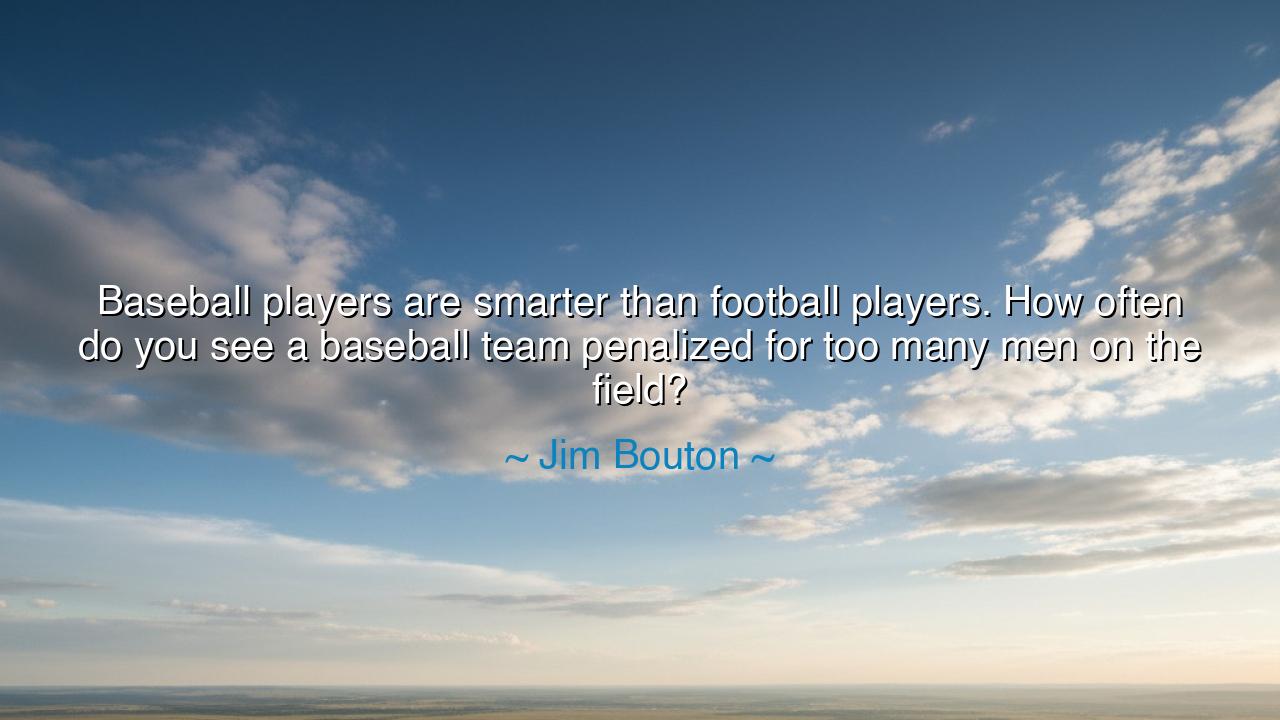
Baseball players are smarter than football players. How often do
Baseball players are smarter than football players. How often do you see a baseball team penalized for too many men on the field?






Hearken, O seekers of insight and discernment, and attend the words of Jim Bouton, who spoke with the wit and observation of one attuned to the subtle rhythms of sport: “Baseball players are smarter than football players. How often do you see a baseball team penalized for too many men on the field?” In these words lies a reflection not only on the nature of games, but upon discipline, situational awareness, and the intellect required to master complexity. Bouton draws attention to the ways in which mental acuity underpins success, revealing that strategy and attention often surpass mere physical prowess.
The origin of this insight rests in Bouton’s own life as a pitcher for the New York Yankees and an observer of sport. Baseball, with its slow tempo punctuated by moments of sudden action, demands vigilance, foresight, and strategic thinking. Unlike football, where chaos and rapid turnover can obscure lapses, baseball exposes mistakes and rewards precise understanding of positioning, timing, and rules. The “too many men on the field” penalty serves as Bouton’s emblem of how attentiveness and intelligence are inseparable from excellence.
Consider the story of Jackie Robinson, who, beyond his athletic gifts, displayed remarkable intellect and awareness on the diamond. His ability to read pitchers, anticipate plays, and maintain discipline in a hostile environment required a sharp mind as much as a strong arm. Bouton’s words echo through Robinson’s example: success in baseball arises from the marriage of physical skill and cerebral mastery, and each decision on the field carries weight comparable to the strike of a sword in battle.
The ancients understood this principle in their contests and arenas. In Greek pankration, or the strategic maneuvering of hoplites, victory was often determined not by sheer strength alone, but by awareness, anticipation, and flawless execution. Even in the chariot races, where speed reigned, attentiveness to placement and timing distinguished the master from the novice. Bouton’s witticism reminds us that intellectual discipline is as vital as physical power in determining the outcome of any contest.
Yet the observation carries a deeper lesson beyond sport. In life, as on the diamond, mistakes often arise not from lack of effort, but from lapses in attention, planning, and situational awareness. Those who cultivate mental acuity, who understand the environment, anticipate consequences, and execute decisions with clarity, are far less likely to suffer avoidable failures. Bouton’s comparison serves as a metaphor for the broader importance of intelligence applied with vigilance.
From this reflection, a lesson emerges: cultivate the mind alongside the body. Success is rarely a matter of effort alone; it requires perception, discipline, and strategic thinking. Attention to detail, awareness of the surrounding circumstances, and careful adherence to the rules create advantage and prevent costly errors. As in baseball, so in life: the keen mind protects, guides, and enables triumph.
Practical action flows naturally: practice mindfulness and situational awareness in daily endeavors. Study the rules, anticipate challenges, and refine your decision-making. Learn to value strategy and foresight as much as raw effort or physical capability. In doing so, one minimizes mistakes, maximizes effectiveness, and positions oneself for consistent success.
Thus, let the words of Jim Bouton endure: intelligence and attentiveness are the pillars upon which excellence rests. While strength, speed, and stamina impress the eye, it is the mind—alert, disciplined, and strategic—that ensures victory, preserves advantage, and transforms effort into enduring achievement. In all contests, athletic or otherwise, mental mastery precedes triumph.






AAdministratorAdministrator
Welcome, honored guests. Please leave a comment, we will respond soon